浅谈化学专业英语写作
- 格式:pdf
- 大小:200.65 KB
- 文档页数:3
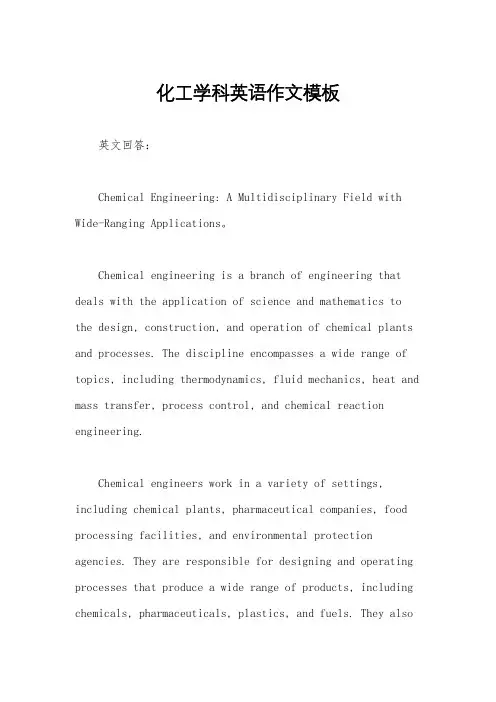
化工学科英语作文模板英文回答:Chemical Engineering: A Multidisciplinary Field with Wide-Ranging Applications。
Chemical engineering is a branch of engineering that deals with the application of science and mathematics to the design, construction, and operation of chemical plants and processes. The discipline encompasses a wide range of topics, including thermodynamics, fluid mechanics, heat and mass transfer, process control, and chemical reaction engineering.Chemical engineers work in a variety of settings, including chemical plants, pharmaceutical companies, food processing facilities, and environmental protection agencies. They are responsible for designing and operating processes that produce a wide range of products, including chemicals, pharmaceuticals, plastics, and fuels. They alsowork to develop and improve processes that are more efficient, less polluting, and safer.Chemical engineering is a rapidly growing field, as the demand for chemicals and other products continues to increase. In addition, the need for sustainable and environmentally friendly processes is driving the development of new technologies and processes in the field.Key Features of Chemical Engineering。
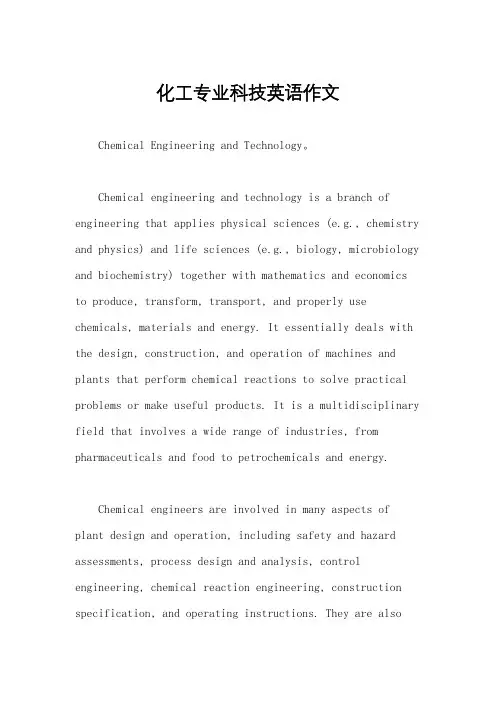
化工专业科技英语作文Chemical Engineering and Technology。
Chemical engineering and technology is a branch of engineering that applies physical sciences (e.g., chemistry and physics) and life sciences (e.g., biology, microbiology and biochemistry) together with mathematics and economics to produce, transform, transport, and properly use chemicals, materials and energy. It essentially deals with the design, construction, and operation of machines and plants that perform chemical reactions to solve practical problems or make useful products. It is a multidisciplinary field that involves a wide range of industries, from pharmaceuticals and food to petrochemicals and energy.Chemical engineers are involved in many aspects ofplant design and operation, including safety and hazard assessments, process design and analysis, control engineering, chemical reaction engineering, construction specification, and operating instructions. They are alsoresponsible for the development of new materials and technologies, such as nanotechnology, fuel cells and biomedical engineering. In addition, they play a key rolein environmental protection and the development of sustainable processes and products.Chemical engineering and technology is a rapidly growing field with great potential for future development. As the demand for energy and materials continues to increase, the need for chemical engineers will also grow. In addition, the increasing focus on environmental sustainability and the development of new technologies will create new opportunities for chemical engineers to make a significant impact on society.One of the key challenges facing chemical engineers today is the need to develop sustainable processes and products. With the increasing awareness of environmental issues and the finite nature of natural resources, there is a growing demand for processes and products that minimize waste, reduce energy consumption, and use renewable resources. Chemical engineers are at the forefront of thiseffort, developing new technologies and processes that are more sustainable and environmentally friendly.Another challenge facing chemical engineers is the need to develop new materials and technologies to meet the demands of a rapidly changing world. As new industries and technologies emerge, there is a growing need for new materials and processes that can meet the demands of these industries. Chemical engineers are working to develop new materials and technologies that can meet the needs of these industries, such as advanced materials for electronics, new materials for energy storage, and new processes for the production of biofuels.In conclusion, chemical engineering and technology is a dynamic and rapidly growing field with great potential for future development. Chemical engineers play a key role in the development of new materials and technologies, the design and operation of chemical processes, and the development of sustainable processes and products. With the increasing demand for energy and materials, and the growingfocus on environmental sustainability, the need for chemical engineers will continue to grow in the future.。
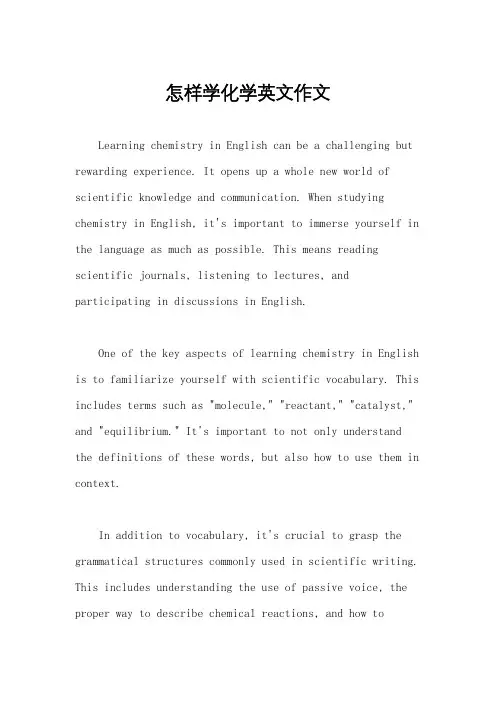
怎样学化学英文作文Learning chemistry in English can be a challenging but rewarding experience. It opens up a whole new world of scientific knowledge and communication. When studying chemistry in English, it's important to immerse yourself in the language as much as possible. This means reading scientific journals, listening to lectures, and participating in discussions in English.One of the key aspects of learning chemistry in English is to familiarize yourself with scientific vocabulary. This includes terms such as "molecule," "reactant," "catalyst," and "equilibrium." It's important to not only understand the definitions of these words, but also how to use them in context.In addition to vocabulary, it's crucial to grasp the grammatical structures commonly used in scientific writing. This includes understanding the use of passive voice, the proper way to describe chemical reactions, and how toconvey complex scientific concepts clearly and accurately.Another important aspect of learning chemistry in English is to practice writing scientific papers and reports. This involves not only conveying scientific information accurately, but also organizing your thoughtsin a clear and logical manner.Furthermore, it's essential to develop strong listening and speaking skills in English. This includes being able to understand lectures and participate in discussions with professors and peers. It's also important to be able to present scientific findings and research in a clear and engaging manner.Overall, learning chemistry in English requires a multifaceted approach that encompasses vocabulary, grammar, writing, and speaking skills. It's a challenging but ultimately rewarding endeavor that opens up opportunities for collaboration and communication in the globalscientific community.。
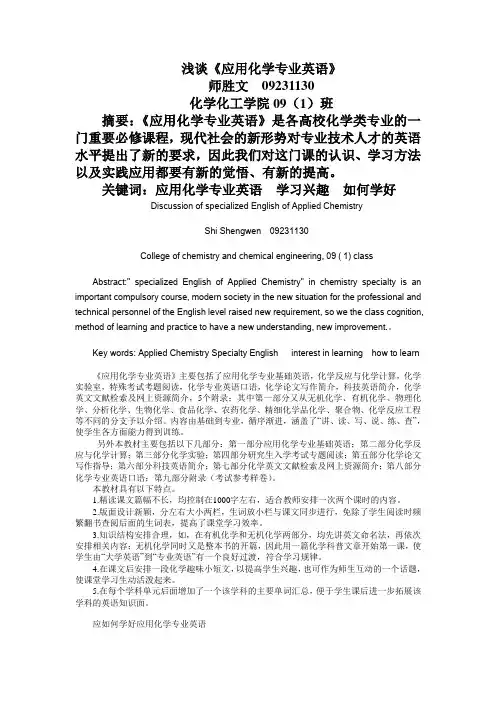
浅谈《应用化学专业英语》师胜文09231130化学化工学院09(1)班摘要:《应用化学专业英语》是各高校化学类专业的一门重要必修课程,现代社会的新形势对专业技术人才的英语水平提出了新的要求,因此我们对这门课的认识、学习方法以及实践应用都要有新的觉悟、有新的提高。
关键词:应用化学专业英语学习兴趣如何学好Discussion of specialized English of Applied ChemistryShi Shengwen 09231130College of chemistry and chemical engineering,09(1)classAbstract:"specialized English of Applied Chemistry"in chemistry specialty is an important compulsory course,modern society in the new situation for the professional and technical personnel of the English level raised new requirement,so we the class cognition, method of learning and practice to have a new understanding,new improvement.。
Key words: Applied Chemistry Specialty English interest in learning how to learn《应用化学专业英语》主要包括了应用化学专业基础英语,化学反应与化学计算,化学实验室,特殊考试考题阅读,化学专业英语口语,化学论文写作简介,科技英语简介,化学英文文献检索及网上资源简介,5个附录;其中第一部分又从无机化学、有机化学、物理化学、分析化学、生物化学、食品化学、农药化学、精细化学品化学、聚合物、化学反应工程等不同的分支予以介绍。
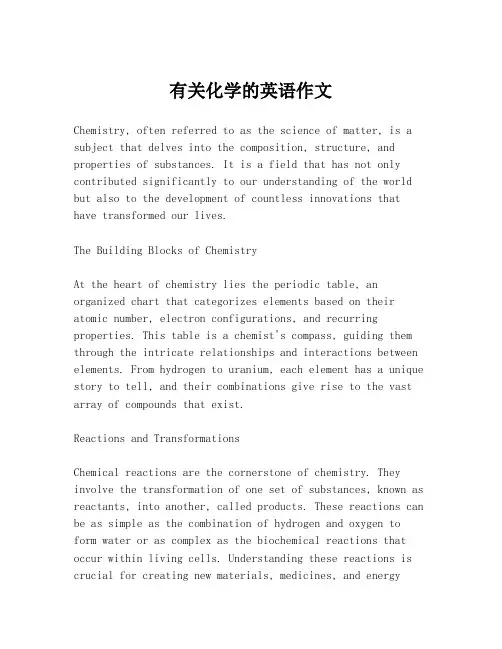
有关化学的英语作文Chemistry, often referred to as the science of matter, is a subject that delves into the composition, structure, and properties of substances. It is a field that has not only contributed significantly to our understanding of the world but also to the development of countless innovations that have transformed our lives.The Building Blocks of ChemistryAt the heart of chemistry lies the periodic table, an organized chart that categorizes elements based on their atomic number, electron configurations, and recurring properties. This table is a chemist's compass, guiding them through the intricate relationships and interactions between elements. From hydrogen to uranium, each element has a unique story to tell, and their combinations give rise to the vast array of compounds that exist.Reactions and TransformationsChemical reactions are the cornerstone of chemistry. They involve the transformation of one set of substances, known as reactants, into another, called products. These reactions can be as simple as the combination of hydrogen and oxygen to form water or as complex as the biochemical reactions that occur within living cells. Understanding these reactions is crucial for creating new materials, medicines, and energysources.The Role of Chemistry in Everyday LifeChemistry is not confined to the laboratory. It is anintegral part of our daily lives. From the plastics and metals we use to the food we eat and the air we breathe, chemistry plays a role. It is involved in the development of fertilizers that increase agricultural yield, the creation of pharmaceuticals that save lives, and the production of cleaner energy sources that combat climate change.The Future of ChemistryAs we look to the future, chemistry continues to be at the forefront of scientific research. With challenges such as sustainable development and disease eradication, the need for chemical innovation is more critical than ever. The development of nanotechnology, the study of materials at the atomic and molecular scale, opens up new possibilities for targeted drug delivery and advanced materials with novel properties.ConclusionChemistry is a subject that bridges the microscopic world of atoms and molecules with the macroscopic world of human experience. It is a field that demands precision, creativity, and a deep understanding of the natural laws that govern our universe. As we continue to unlock the secrets of matter, chemistry will undoubtedly play a pivotal role in shaping thefuture for the betterment of all.In conclusion, chemistry is not just a school subject; it is a powerful tool that helps us understand and manipulate the world around us. It is the science that enables us to transform raw elements into life-saving medicines, to create the technology that connects us, and to find solutions to the pressing issues of our time. As we delve deeper into the atomic realm, the horizon of what is possible expands, and the role of chemistry in our lives becomes ever more significant.。
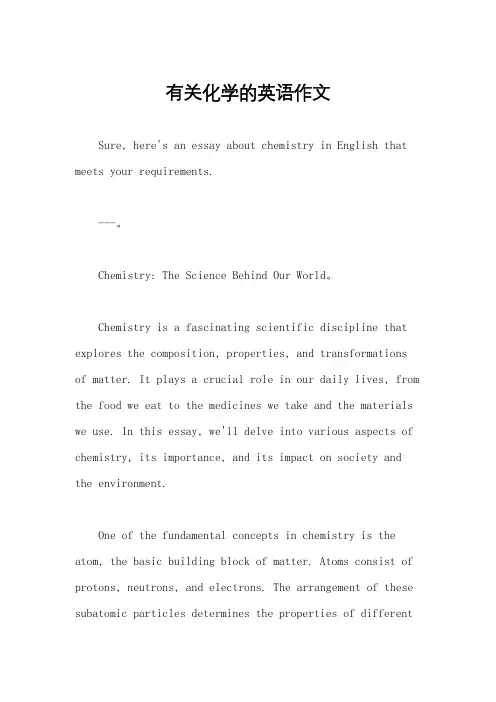
有关化学的英语作文Sure, here's an essay about chemistry in English that meets your requirements.---。
Chemistry: The Science Behind Our World。
Chemistry is a fascinating scientific discipline that explores the composition, properties, and transformations of matter. It plays a crucial role in our daily lives, from the food we eat to the medicines we take and the materials we use. In this essay, we'll delve into various aspects of chemistry, its importance, and its impact on society and the environment.One of the fundamental concepts in chemistry is the atom, the basic building block of matter. Atoms consist of protons, neutrons, and electrons. The arrangement of these subatomic particles determines the properties of differentelements. For instance, carbon atoms have six protons,while oxygen atoms have eight. This variance in atomic structure leads to the vast diversity of elements and compounds that form the basis of chemistry.Chemical reactions are another core aspect of chemistry. These reactions involve the breaking and forming ofchemical bonds between atoms, resulting in the creation of new substances with unique properties. Understanding chemical reactions is essential for developing new materials, drugs, and technologies. For example, pharmaceutical companies rely on chemistry to design and synthesize effective medications that treat various ailments.The periodic table of elements is a cornerstone of chemistry, organizing elements based on their atomic number, electron configuration, and chemical properties. Dmitri Mendeleev's development of the periodic tablerevolutionized the field of chemistry, providing a systematic framework for understanding and predicting the behavior of elements. Today, the periodic table continuesto evolve as new elements are discovered and synthesized in laboratories.One of the most significant applications of chemistry is in environmental science. Environmental chemists study the interactions between pollutants, natural substances, and ecosystems. They work to develop strategies for mitigating pollution, conserving resources, and promoting sustainable practices. For instance, advancements in green chemistry focus on reducing the environmental impact of chemical processes by minimizing waste and using renewable resources.The field of biochemistry explores the chemical processes within living organisms. It delves into the structure and function of biological molecules such as proteins, carbohydrates, lipids, and nucleic acids. Biochemists investigate how these molecules interact to support life functions, from metabolism to genetic information transfer. Their research contributes to advancements in medicine, biotechnology, and agriculture.Chemistry also plays a crucial role in industry and technology. Chemical engineers design processes for producing chemicals, fuels, and materials on a large scale. They optimize production efficiency, reduce costs, and ensure product quality and safety. From the manufacture of plastics and polymers to the production of clean energy sources like solar cells and batteries, chemistry underpins numerous industries that drive economic growth and innovation.In conclusion, chemistry is a multifaceted science with vast applications and implications. Its principles govern the behavior of matter at the atomic and molecular levels, shaping our understanding of the natural world and driving advancements in various fields. From fundamental research to practical applications, chemistry continues to enrich our lives and pave the way for a more sustainable and technologically advanced future.---。
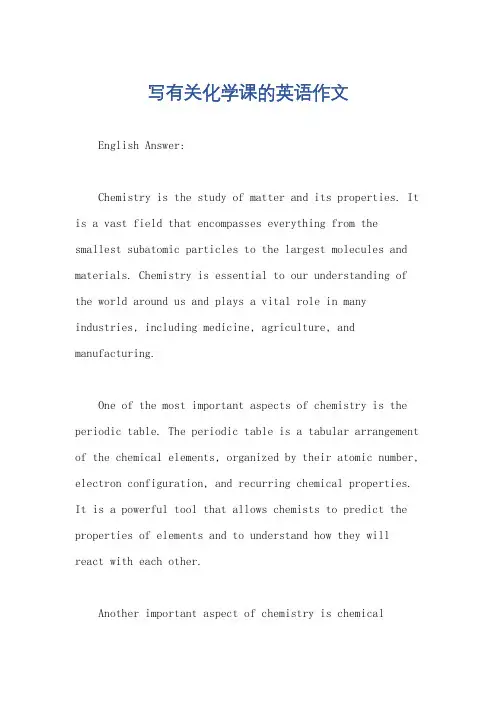
写有关化学课的英语作文English Answer:Chemistry is the study of matter and its properties. It is a vast field that encompasses everything from the smallest subatomic particles to the largest molecules and materials. Chemistry is essential to our understanding of the world around us and plays a vital role in many industries, including medicine, agriculture, and manufacturing.One of the most important aspects of chemistry is the periodic table. The periodic table is a tabular arrangement of the chemical elements, organized by their atomic number, electron configuration, and recurring chemical properties. It is a powerful tool that allows chemists to predict the properties of elements and to understand how they will react with each other.Another important aspect of chemistry is chemicalbonding. Chemical bonding is the process by which atoms or ions are held together to form molecules and compounds. There are three main types of chemical bonding: ionic bonding, covalent bonding, and metallic bonding. Ionic bonding occurs when one atom transfers electrons to another atom, resulting in the formation of ions. Covalent bonding occurs when two atoms share electrons to form a covalent bond. Metallic bonding occurs when metal atoms share their valence electrons to form a sea of electrons.Chemistry is a challenging but rewarding subject. It requires a strong foundation in math and physics, as well as a good understanding of the scientific method. However, the rewards of studying chemistry are great. Chemistry can open doors to a wide range of careers in science, medicine, and engineering.中文回答:化学是什么?化学是一门研究物质及其性质的学科。
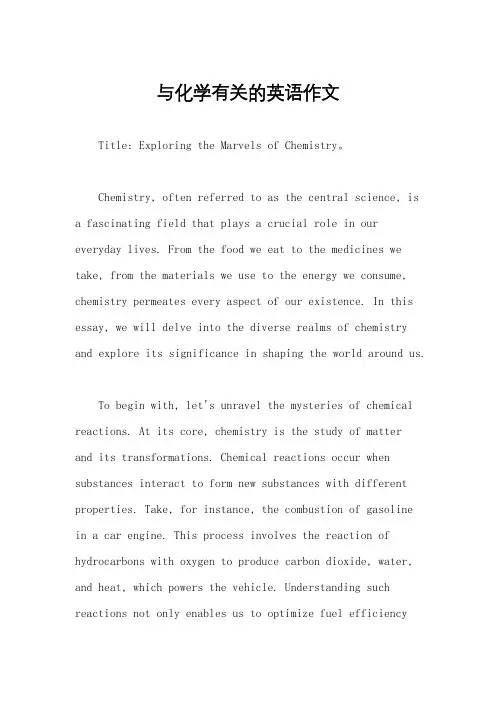
与化学有关的英语作文Title: Exploring the Marvels of Chemistry。
Chemistry, often referred to as the central science, is a fascinating field that plays a crucial role in our everyday lives. From the food we eat to the medicines we take, from the materials we use to the energy we consume, chemistry permeates every aspect of our existence. In this essay, we will delve into the diverse realms of chemistry and explore its significance in shaping the world around us.To begin with, let's unravel the mysteries of chemical reactions. At its core, chemistry is the study of matterand its transformations. Chemical reactions occur when substances interact to form new substances with different properties. Take, for instance, the combustion of gasolinein a car engine. This process involves the reaction of hydrocarbons with oxygen to produce carbon dioxide, water, and heat, which powers the vehicle. Understanding such reactions not only enables us to optimize fuel efficiencybut also helps in mitigating environmental impacts by reducing emissions.Furthermore, chemistry plays a pivotal role in the realm of medicine. Pharmaceutical chemistry focuses on the design, synthesis, and analysis of drugs to treat various ailments. For example, the discovery of antibiotics revolutionized medicine by providing effective treatmentfor bacterial infections. Moreover, advancements in medicinal chemistry have led to the development of targeted therapies for diseases like cancer, where drugs are designed to selectively target cancer cells while minimizing harm to healthy tissues. Chemistry not only saves lives but also enhances the quality of life for millions of people worldwide.In addition to its contributions to health and technology, chemistry also underpins the production of materials essential for modern society. Polymers, for instance, are large molecules composed of repeating units, and they form the basis of countless products, fromplastics and fibers to adhesives and coatings. Bymanipulating the molecular structure of polymers, chemists can tailor their properties to meet specific needs, such as flexibility, durability, or biodegradability. Moreover, advancements in nanotechnology have opened up new frontiers in material science, allowing for the development of novel materials with unique properties and applications.Moreover, chemistry intersects with environmental science in profound ways. The study of environmental chemistry examines the behavior of chemicals in the environment, their impact on ecosystems, and strategies for pollution prevention and remediation. For instance, the ozone layer, which protects life on Earth from harmful ultraviolet radiation, has been threatened by the release of ozone-depleting substances such as chlorofluorocarbons (CFCs). Through international agreements like the Montreal Protocol, chemistry has played a critical role in phasing out the production and use of these harmful chemicals, thus safeguarding the ozone layer and mitigating the risk of skin cancer and other adverse effects.In conclusion, chemistry is a multifaceted disciplinethat touches every aspect of our lives, from the air we breathe to the products we use. Through the study of chemical reactions, the development of life-saving drugs, the production of advanced materials, and the preservation of the environment, chemistry enriches our understanding of the world and empowers us to address complex challenges facing society. As we continue to explore the marvels of chemistry, we unlock new possibilities for innovation, sustainability, and human well-being.。
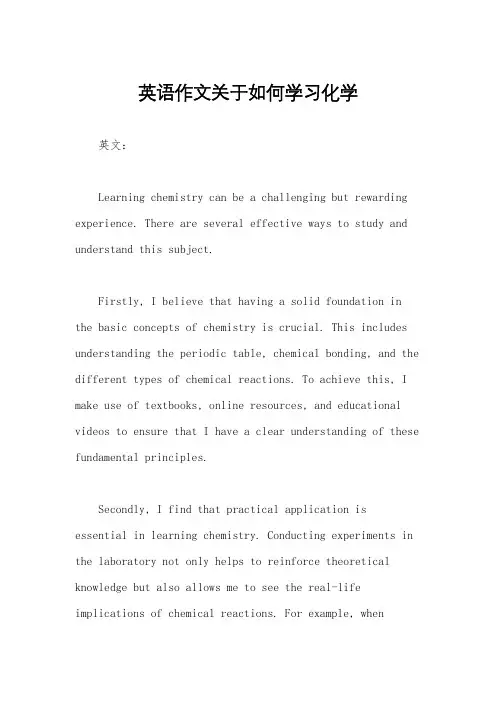
英语作文关于如何学习化学英文:Learning chemistry can be a challenging but rewarding experience. There are several effective ways to study and understand this subject.Firstly, I believe that having a solid foundation in the basic concepts of chemistry is crucial. This includes understanding the periodic table, chemical bonding, and the different types of chemical reactions. To achieve this, I make use of textbooks, online resources, and educational videos to ensure that I have a clear understanding of these fundamental principles.Secondly, I find that practical application isessential in learning chemistry. Conducting experiments in the laboratory not only helps to reinforce theoretical knowledge but also allows me to see the real-life implications of chemical reactions. For example, whenlearning about the concept of stoichiometry, I performed experiments to determine the precise quantities of reactants and products involved in a chemical reaction. This hands-on approach has greatly enhanced my understanding of the subject.Furthermore, I make it a point to engage in regular practice and revision. I solve a variety of problems and questions to test my understanding of different topics within chemistry. Additionally, I review my notes and create summary sheets to condense the information for easier recall. This constant revision helps to solidify my knowledge and ensures that I am well-prepared for examinations.In addition to these methods, I also find it helpful to seek assistance from my peers and teachers. Discussing challenging concepts with classmates and seeking clarification from teachers has provided me with different perspectives and insights, enabling me to grasp difficult concepts more effectively.Moreover, I believe that making connections between different topics in chemistry is essential for a comprehensive understanding of the subject. For instance, when studying organic chemistry, I relate the structure and properties of different organic compounds to theirreactivity and uses in everyday life. This approach not only makes learning more interesting but also helps me to see the bigger picture of how chemistry is applied in various fields.In conclusion, learning chemistry requires a combination of understanding the basics, practical application, regular practice, seeking assistance, and making connections between different concepts. By adopting these strategies, I have found that my understanding and appreciation of chemistry has greatly improved.中文:学习化学可能是一个充满挑战但又值得的经历。

如何学好化学英语作文初三Chemistry is a fascinating subject that studies the composition, structure, properties, and changes of matter. It is a fundamental part of science and is essential for understanding the world around us. In order to excel in chemistry, it is important to have a strong foundation in both the principles of chemistry and the language in which it is communicated – English. Here are some tips on how to improve your understanding of chemistry in English:1. Build a strong vocabulary: Chemistry has its own set of vocabulary that can be challenging to understand and remember. Make flashcards of key terms and concepts and review them regularly. Use online resources like Quizlet or Memrise to practice and reinforce your knowledge of chemistry terms.2. Read textbooks and articles: To improve your understanding of chemistry in English, it is important to read textbooks, articles, and research papers. This will expose you to different writing styles and help you become familiar with the language used in the field. Take notes while you read and highlight key concepts to reinforce your learning.3. Practice speaking and listening: In addition to reading and writing, it is important to practice speaking and listening skills in English. Join a study group, participate in class discussions, and seek out opportunities to converse with native English speakers about chemistry topics. This will help you improve your pronunciation and ability to communicate effectively.4. Watch educational videos: There are many online resources that offer educational videos on chemistry topics. Watch videos on YouTube channels like CrashCourse Chemistry or Khan Academy to supplement your learning and gain a deeper understanding of complex concepts. Take notes while you watch and pause to review and reflect on key points.5. Work on writing skills: Chemistry is a subject that requires strong writing skills to communicate complex ideas clearly and effectively. Practice writing lab reports, essays, and research papers in English to improve your ability to express thoughts and ideas. Ask for feedback from teachers or peers to help you refine your writing skills.6. Seek out additional resources: There are many resources available to help you improve your understanding of chemistry in English. Take advantage of online forums, tutoring services, and study guides to supplement your learning. Don’t be afraid to ask questions and seek clarification on topics that you find challenging.7. Stay organized and motivated: Studying chemistry in English can be challenging, but staying organized and motivated will help you succeed. Create a study schedule, set goals for yourself, and track your progress to stay on track. Remember that learning a new language and subject takes time and effort, so be patient with yourself and stay focused on your goals.In conclusion, learning chemistry in English is a rewarding and fulfilling experience that will expand your knowledge and understanding of the world. By building a strong vocabulary, reading extensively, practicing speaking and listening skills, watching educational videos, working on writing skills, seeking out additional resources, and staying organized and motivated, you can excel in chemistry and become proficient in the language of science. Good luck on your journey to mastering chemistry in English!。
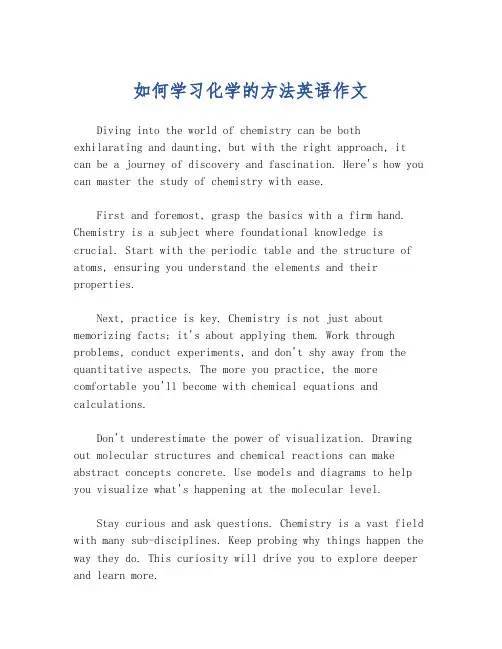
如何学习化学的方法英语作文Diving into the world of chemistry can be both exhilarating and daunting, but with the right approach, it can be a journey of discovery and fascination. Here's how you can master the study of chemistry with ease.First and foremost, grasp the basics with a firm hand. Chemistry is a subject where foundational knowledge is crucial. Start with the periodic table and the structure of atoms, ensuring you understand the elements and their properties.Next, practice is key. Chemistry is not just about memorizing facts; it's about applying them. Work through problems, conduct experiments, and don't shy away from the quantitative aspects. The more you practice, the more comfortable you'll become with chemical equations and calculations.Don't underestimate the power of visualization. Drawing out molecular structures and chemical reactions can make abstract concepts concrete. Use models and diagrams to help you visualize what's happening at the molecular level.Stay curious and ask questions. Chemistry is a vast field with many sub-disciplines. Keep probing why things happen the way they do. This curiosity will drive you to explore deeper and learn more.Leverage technology. There are numerous apps and online resources that can help you learn chemistry in an interactive way. Simulations and virtual labs can provide a different perspective and enhance your understanding.Join a study group or find a study partner. Bouncingideas off others can clarify concepts and reinforce your learning. It also provides a support system when the subject gets tough.Lastly, keep the big picture in mind. Chemistry is notjust about passing an exam; it's about understanding theworld around us. Connect what you learn to real-world applications, whether it's in medicine, environmental science, or materials engineering.Remember, the study of chemistry is a marathon, not a sprint. It requires patience, persistence, and a genuine interest in the subject. With the right methods and a passion for learning, you'll find that chemistry can be one of the most rewarding subjects to delve into.。
英语作文关于化学的内容Title: The Marvels of Chemistry。
Chemistry, often dubbed as the "central science," is a captivating realm where elements, compounds, and reactions dance in intricate harmony, shaping the very fabric of our world. From the simplest of molecules to the most complex polymers, chemistry permeates every aspect of our lives, from the air we breathe to the food we consume. In this discourse, we delve into the wonders of chemistry, exploring its profound impact on humanity and the natural world.At the heart of chemistry lies the periodic table, a visual testament to the diversity and beauty of the elements. From the noble gases to the transition metals, each element possesses unique properties that dictate its behavior in chemical reactions. Hydrogen, the simplest of elements, fuels the mighty stars through fusion, while carbon, the backbone of life, forms the intricate moleculesessential for biological processes.One cannot discuss chemistry without delving into the realm of chemical reactions. These transformative processes, governed by the laws of thermodynamics and kinetics, underpin countless natural phenomena and human innovations. From the combustion of fuels to the synthesis of pharmaceuticals, chemical reactions drive progress and innovation across industries.Organic chemistry, the study of carbon-based compounds, holds particular significance in both scientific research and everyday life. From the synthesis of pharmaceuticals to the development of sustainable materials, organic chemistry serves as a cornerstone of modern society. The discovery of new reactions and the synthesis of novel compounds continue to expand the frontiers of organic chemistry, offering solutions to pressing global challenges.Inorganic chemistry, on the other hand, explores the properties and behavior of non-carbon-based compounds. From metal complexes to coordination polymers, inorganicchemistry elucidates the structures and reactivities of diverse chemical species. Applications of inorganic chemistry range from catalysis and materials science to environmental remediation, highlighting itsinterdisciplinary nature and societal relevance.Physical chemistry, the marriage of physics and chemistry, unravels the underlying principles governing chemical systems' behavior. From quantum mechanics to statistical thermodynamics, physical chemistry provides a theoretical framework for understanding molecular interactions and reaction mechanisms. Applications of physical chemistry extend to fields such as chemical kinetics, spectroscopy, and surface science, driving innovation in diverse scientific disciplines.Biochemistry, the study of chemical processes within living organisms, bridges the gap between chemistry and biology. From the structure of DNA to enzymatic catalysis, biochemistry elucidates the molecular mechanisms underlying life's phenomena. Applications of biochemistry encompass fields such as medicine, biotechnology, and agriculture,offering insights into disease mechanisms and therapeutic interventions.Furthermore, environmental chemistry investigates the interactions between chemical species and the Earth's atmosphere, hydrosphere, and lithosphere. From the degradation of pollutants to the cycling of nutrients, environmental chemistry plays a pivotal role in addressing global environmental challenges. Sustainable practices and pollution remediation strategies hinge upon a profound understanding of environmental chemistry principles.In conclusion, chemistry embodies a rich tapestry of knowledge, encompassing diverse subdisciplines and applications that touch every aspect of our lives. From fundamental research to practical innovations, chemistry continues to shape our understanding of the natural world and drive progress toward a sustainable future. As we navigate the complexities of the 21st century, the marvels of chemistry serve as beacons of knowledge and inspiration, guiding us toward a brighter tomorrow.。
英语讨论化学问题作文Title: Exploring the Fascinating World of Chemistry through English Discourse。
Chemistry, often referred to as the central science, serves as a bridge between the realms of physics and biology, offering profound insights into the composition, structure, properties, and changes of matter. In this discourse, we embark on a journey to delve into various intriguing aspects of chemistry, all while communicating in the language of English.One of the fundamental concepts in chemistry is the notion of chemical bonding. Chemical bonds are the forces that hold atoms together in molecules and compounds. They play a pivotal role in determining the properties of substances. There are primarily three types of chemical bonds: covalent bonds, ionic bonds, and metallic bonds. Covalent bonds involve the sharing of electrons between atoms, typically found in non-metallic elements andcompounds. Ionic bonds, on the other hand, involve the transfer of electrons from one atom to another, resulting in the formation of ions which are held together by electrostatic forces. Metallic bonds occur in metals and involve the delocalization of electrons within a lattice of positively charged ions.Acids and bases constitute another fundamental concept in chemistry, with numerous applications in various industries and everyday life. Acids are substances that donate protons (H⁺ ions), while bases are substances that accept protons. The pH scale is commonly used to measure the acidity or basicity of a solution, ranging from 0 (highly acidic) to 14 (highly basic), with 7 being neutral. Strong acids and bases completely dissociate in solution, while weak acids and bases only partially dissociate.Chemical reactions are the heart of chemistry, where substances undergo transformations, leading to the formation of new substances with different properties. There are several types of chemical reactions, including synthesis, decomposition, single replacement, doublereplacement, combustion, and redox reactions. Understanding these reactions is crucial for various fields, including pharmaceuticals, materials science, and environmental science.The periodic table serves as a cornerstone in the study of chemistry, providing a systematic arrangement ofelements based on their atomic number, electron configuration, and chemical properties. Dmitri Mendeleev is credited with the initial development of the periodic table, organizing elements into rows and columns based on their properties. The periodic table allows chemists to predict the behavior of elements and their compounds, facilitating the discovery of new substances and the understanding of chemical trends.Organic chemistry focuses on the study of carbon-containing compounds, which form the basis of life on Earth. Organic compounds are incredibly diverse, ranging from simple hydrocarbons to complex biomolecules such as proteins, carbohydrates, lipids, and nucleic acids. Thefield of organic chemistry encompasses the study of theirstructure, properties, reactions, and synthesis, playing a vital role in fields such as medicine, agriculture, and materials science.In conclusion, chemistry is a captivating scientific discipline that unveils the mysteries of matter and its transformations. Through the medium of English discourse, we have explored various facets of chemistry, ranging from chemical bonding and acids/bases to chemical reactions, the periodic table, and organic chemistry. As we continue to unravel the complexities of the chemical world, let us embrace the beauty and significance of this fascinating field of study.。
与化学有关的英语作文Chemistry is the study of matter and the changes it undergoes. It is a fascinating and complex field that has a profound impact on our daily lives. From the food we eat to the medicines we take, from the clothes we wear to the technology we use, chemistry plays a crucial role in shaping the world around us.One of the most important aspects of chemistry is its role in the development of new materials. Chemists are constantly working to create new and improved materialsthat have a wide range of applications. For example, the development of new polymers has revolutionized the way we produce and use plastics, making them more durable, lightweight, and environmentally friendly. In addition, advances in nanotechnology have led to the creation of new materials with unique properties, such as super-strong carbon nanotubes and ultra-thin graphene sheets.Another important area of chemistry is the study ofchemical reactions. By understanding how different substances react with each other, chemists are able to develop new processes for producing important chemicals and materials. For example, the Haber process, which converts nitrogen and hydrogen into ammonia, has had a profound impact on the production of fertilizers and has helped to feed the world's growing population. Similarly, the development of new catalysts has led to more efficient and environmentally friendly ways of producing important chemicals, such as pharmaceuticals and fuels.Chemistry also plays a crucial role in the developmentof new drugs and medicines. By understanding the chemical properties of different substances, chemists are able to design and synthesize new drugs that can treat a wide range of diseases and conditions. For example, the development of new antibiotics has revolutionized the way we treatbacterial infections, while the discovery of new cancer drugs has given hope to millions of people around the world.In addition to its practical applications, chemistryalso has a profound impact on our understanding of thenatural world. By studying the properties and behavior of different substances, chemists are able to gain insightsinto the fundamental processes that govern the world around us. For example, the study of chemical reactions in the atmosphere has led to a better understanding of airpollution and climate change, while the study of the chemical composition of rocks and minerals has provided valuable insights into the Earth's history and evolution.In conclusion, chemistry is a fascinating and important field that has a profound impact on our daily lives. Fromthe development of new materials and the study of chemical reactions to the development of new drugs and our understanding of the natural world, chemistry plays acrucial role in shaping the world around us. As our understanding of chemistry continues to grow, so too will our ability to harness its power for the benefit of society.。
关于化学英文作文Title: The Marvels of Chemistry: Exploring the Wondersof Matter。
Chemistry is an enchanting realm where matter revealsits secrets through intricate dances of atoms and molecules. From the tiniest subatomic particles to the vast expanse of the universe, chemistry permeates every aspect of our existence, shaping the world around us in profound ways.At the heart of chemistry lies the periodic table, a testament to the diversity and unity of matter. Each element, with its unique atomic structure and properties, contributes to the rich tapestry of chemical phenomena. From the noble gases that stand aloof to the reactivemetals that readily engage in chemical transformations, the elements form the building blocks of all matter.One of the most captivating aspects of chemistry is its ability to transform substances through chemical reactions.Whether it's the combustion of fuels to produce energy, the synthesis of pharmaceuticals to heal the sick, or the fermentation of foods to tantalize our taste buds, chemical reactions are ubiquitous in our daily lives. Through the interplay of reactants and products, chemical reactions unveil the intricate mechanisms underlying natural processes.Moreover, chemistry offers a glimpse into the mysteries of the microscopic world. At the nanoscale, where atoms and molecules reign supreme, new properties emerge, defying conventional wisdom. Nanotechnology, born from the marriage of chemistry and physics, has revolutionized industries ranging from electronics to medicine, offering unprecedented control over matter at the molecular level.Furthermore, chemistry is indispensable in addressing pressing global challenges, such as environmental pollution and climate change. Through innovations in green chemistry, researchers strive to develop sustainable solutions that minimize waste and reduce the environmental impact of chemical processes. From biodegradable polymers torenewable energy sources, chemistry holds the key to a more sustainable future.Beyond its practical applications, chemistry also captivates the imagination through its sheer beauty and elegance. From the symmetrical structures of crystals to the vibrant hues of transition metal complexes, chemistry delights the senses and inspires awe. The intricate dance of electrons within molecules, governed by the laws of quantum mechanics, gives rise to a kaleidoscope of chemical phenomena that never ceases to amaze.In conclusion, chemistry is a captivating journey into the mysteries of matter, offering endless opportunities for exploration and discovery. From the humble beginnings of the alchemists to the cutting-edge research of modern chemists, the quest to unravel the secrets of the universe continues unabated. As we delve deeper into the realms of chemistry, may we marvel at the wonders of matter and harness its power for the betterment of humankind.。
化学专题英语作文模板英文回答:Chemistry: A Journey of Discovery。
Chemistry is the scientific study of the structure, properties, and behavior of matter. It is a fundamental science that has applications in many fields, including medicine, engineering, and agriculture.The history of chemistry can be traced back to ancient times. Alchemists in the Middle Ages were interested in transforming base metals into gold. Although they were unsuccessful in their quest, their work laid the foundation for modern chemistry.In the 18th century, Antoine Lavoisier developed the law of conservation of mass. This law states that mass is neither created nor destroyed in a chemical reaction. Lavoisier's work helped to establish chemistry as aquantitative science.In the 19th century, John Dalton developed the atomic theory. This theory states that all matter is composed of atoms. Dalton's work helped to explain the behavior of gases and the formation of chemical compounds.In the 20th century, chemists made great strides in understanding the structure of atoms. This led to the development of quantum mechanics, which is the theory that describes the behavior of atoms and molecules.Today, chemistry is a vast and complex science. Chemists are working to develop new materials, drugs, and treatments for diseases. They are also working to understand the environmental impact of chemicals and to develop sustainable solutions.Chemistry is a fascinating and challenging science. It is a science that is constantly evolving and that has the potential to make a positive impact on the world.中文回答:化学,发现之旅。
与化学英语作文模板英文回答:Introduction。
Chemistry is the study of matter and its properties, and the changes that matter undergoes. It is a vast and complex subject, encompassing a wide range of topics from the structure of atoms to the interactions of molecules. Chemistry has applications in many fields, including medicine, agriculture, and industry.The Importance of Chemistry。
Chemistry is essential for our understanding of the world around us. It helps us to understand the properties of the materials we use in everyday life, and to develop new materials with improved properties. Chemistry also plays a vital role in the development of new drugs, fertilizers, and other products that improve our quality oflife.The Challenges of Chemistry。
While chemistry is a fascinating and rewarding subject, it can also be challenging. The complexity of chemical reactions and the vast amount of information that must be learned can make it difficult for students to master the subject. However, with hard work and dedication, anyone can succeed in chemistry.How to Succeed in Chemistry。